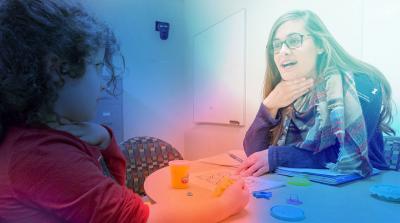PhD Programs of Study
The PhD program at the University of Illinois is designed to prepare students for academic research careers in communication sciences and disorders.
Our goal is to prepare visionary leaders to fill a variety of influential career positions such as academic appointments at research-intensive and teaching universities, research or clinical scientists, or positions in health or educational policy. The PhD program is rigorous in expectations but flexible in regard to areas of prior study and requirements. This allows students to develop an individualized program of study that takes advantage of the variety of courses and lab experiences available at the University of Illinois. Students develop their program of study in consultation with their advising committee. Sample programs are provided below. Departmental faculty mentors and their areas of expertise are provided here.
Sample Programs
Applied Psycholinguistics
Programs of study focused on the linguistic and psycholinguistic bases of language acquisition and developmental language disorders. Research methods may include psychological experiments, linguistic analyses, single-subject design, intervention design, and longitudinal growth modeling.
Autism and Communication Disorders in Childhood
Programs of study focused on the cognitive, social, and complex communication needs of children with autism and other complex conditions. Research methods may include observational studies, descriptive case studies, single-subject design, intervention design.
Communication Neuroscience
Programs of study focused on the neurobiological foundations of normal and disordered language and communication. Research methods may include psychological experiments, communication and linguistic analyses, computational modeling, magnetic resonance imaging, and behavioral genetic studies.
Neuromuscular mechanisms of laryngeal aging and vocal exercise
Programs of study focused on the laryngeal neuromuscular mechanisms underlying advanced age and vocal exercise. Research methods may include clinical trials, magnetic resonance imaging, clinical voice assessments (including high-speed laryngeal endoscopy), behavioral animal models, and wet lab techniques (such as immunohistochemistry and fluorescent confocal microscopy).

